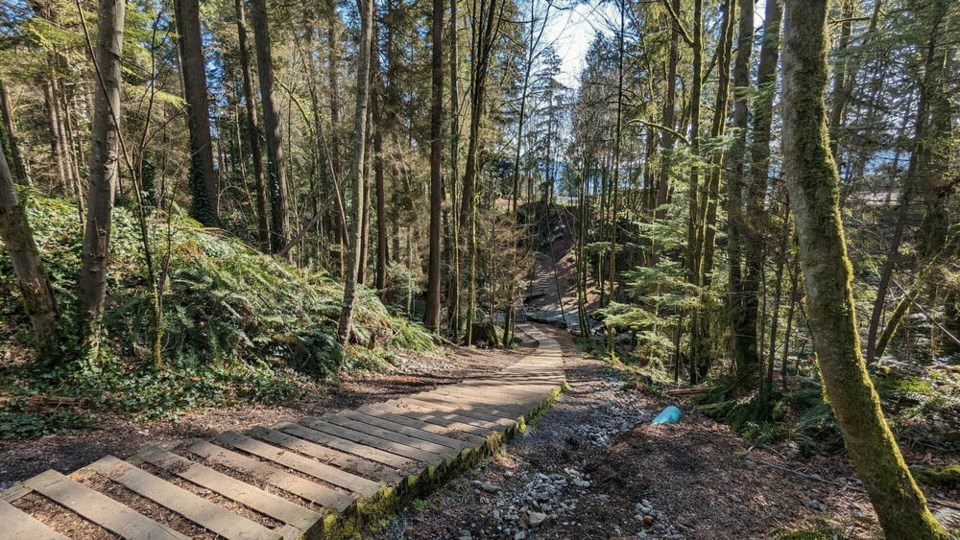While there are many line items on the District of North Vancouver’s newly approved capital plan, a much-discussed active transportation route guided most of the discussion at council.
At a regular meeting Jan. 27, a narrow majority of council voted to pass the 2025 to 2029 capital plan, which included $29.8 million in reduced capital spending and $25.4 million in added borrowing.
The successful vote also directed staff to prepare a draft financial plan for the next five years, based on a 5.5-per-cent property tax increase.
During council’s debate, there was consensus on the tax increase amount, but Couns. Catherine Pope, Jim Hanson and Jordan Back all dissented in the vote. Instead, they advocated that the capital plan vote should have been deferred until after an upcoming Spirit Trail discussion Feb. 10.
Presenting to council, DNV chief financial officer Rick Danyluk said the capital plan addresses a $55-million funding gap identified last July. The spending reduction and added borrowing were based on staff recommendation, public engagement in September and direction from council.
There will be further opportunities to amend the plan in the spring and fall, he said. But the deadline for the plan’s bylaw is April 7.
“It continues to be a challenging environment for capital planning, and early approval of the plan helps secure the best value and enables more progress on council priorities,” he said.
In the proposed changes to the capital plan are items considered “lower priority in a limited funding environment.” Those include a reduction in Spirit Trail funding from $20 million to $15 million to either complete with reduced scope, secure additional grants or finish with original scope outside the five-year plan.
There will also by reduced project scope in adding public electric vehicle charging stations, as well as the deferral of two gravel field conversions to artificial turf – at Kilmer and Delbrook parks – to accommodate the $8.9-million installation of the turf field at Handsworth Secondary.
Members of the public voice concerns on Spirit Trail funding
At the top of the Jan. 27 meeting, a couple members of the public voiced their concerns on cutting back the Spirit Trail.
Andy McKay, a Deep Cove resident and cyclist, said Parkgate is an important hub for him – where his church, gym, library and his own business are located.
“I was concerned to hear that we might be cutting funding for the Spirit Trail past Parkgate,” he said. “I would like to be able to get around my neighbourhood and get to my essential services in a safe manner that allows me to do that using bike routes.”
Mayor Mike Little highlighted today’s challenging financial environment, especially the Canadian dollar’s decline in purchasing power and how that impacts construction contracts.
The cost for the Spirit Trail to cross McCartney creek has been estimated at $7 million, he said.
“That’s a little shocking, that that’s the kind of ballpark we’re in for such short stretches,” Little said. “And you have to go back and reevaluate your priorities and say, ‘All right, well, is there another way we can do this that’s going to be more cost effective. Or those kinds of contracts coming back, are they going to start making some decisions for us?’”
Pope agreed that everyone is facing financial challenges, which have been compounded by the North Shore Wastewater Treatment Plant fiasco spiking average utility fees to $1,150 this year.
But this capital plan divides district residents between young, active families and longtime homeowners with significant wealth, she said.
“When we sent out a survey last fall and asked residents what their top priorities were in terms of services, parks and rec services including sports amenities, were the second highest priority, even ahead of police services,” Pope said. “Last year, we raised taxes and committed to providing that, and now we’re being asked to forget about our commitments, go back on our promises, and cut and defer some of these important projects.
“Well, I think the community has had enough,” she said. “People are tired of us not doing what we say we’re going to do.”
Some councillors advocate for delay of capital plan vote
Coun. Lisa Muri said governments aren’t spending within their means.
“The growth in Metro Vancouver is requiring infrastructure to be upgraded, and growth has not paid for growth,” she said, adding that budget items like infrastructure maintenance get top priority.
Regarding the Spirit Trail, she acknowledged that the community and council hadn’t yet found alignment on some parts of the project.
“Unfortunately, we’re having a discussion about the spirit trail on Feb. 10. Too bad we didn’t have it before this meeting,” Muri said.
Hanson said that fiscal responsibility supersedes any individual project, but that much has changed since council last discussed the Spirit Trail.
“I believe it would be appropriate to delay approval of this capital plan at very least until we have a discussion with respect to the Spirit Trail.
While Hanson, Pope and Back all advocated the capital plan vote to be delayed, Little said council should vote on the current motion before considering alternatives. He added that priorities could change at other budget discussions later in the year.
Ultimately, the capital plan passed with a 4-3 vote.
[email protected]
twitter.com/nick_laba
@nicklaba.bsky.social
Want to stay updated on North Vancouver and West Vancouver news? Sign up for our free daily newsletter.





